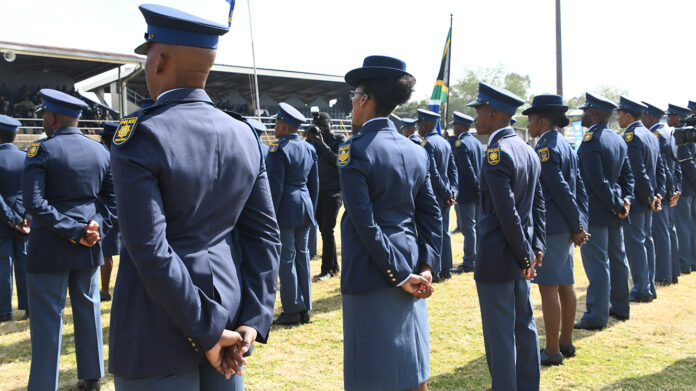Police unions have hailed the South African Police Service (SAPS) for the launch of its online applications system.
The police force seeks to fill 5 500 police trainee vacancies, a move the unions say is a step in the right direction towards combating crime, dealing with the shortage of police officers, and allowing young people in rural areas to apply without having to incur transport costs.
South African Policing Union (Sapu) national spokesperson Lesiba Thobakgale said his organisation welcomes the initiative, a first for the SAPS.
“Sapu welcomes the initiative, as we know SAPS needs more manpower to combat crime.
“We would have loved to see the consistent 10 000 initiative continuing as pronounced (promised) by the president during the State of the Nation Address a few years back.
“The e-recruitment is a step in the right direction.
“SAPS is also making recruitment easier for applicants. We must commend the management for that.
The more manpower SAPS has, the more it can achieve in the fight against crime. The young people who are being recruited will bring a positive change to those efforts,” said Thobakgale.
He said Sapu is happy that the SAPS now allows young people up to the age of 35 to apply, from a previous cap of 30, “to accommodate more young people who wish to serve their country”.
Police and Prisons Civil Rights Union national spokesperson Richard Mamabolo said online
recruitment opens the employment opportunity to more young people outside urban centres.
“The overwhelming response – with over 185 000 applications within just 48 hours for only 5 500 available positions – clearly shows the desperation and urgency among young South Africans to access employment opportunities, and the desire of many to
serve and protect their communities.
“The shift to an online application system is a game changer. It makes the process far more
accessible, especially for young people in rural areas who would traditionally face transport and cost barriers.
“Moving from manual to digital was necessary to improve transparency, reduce corruption and speed up processing,” said Mamabolo, adding that the application window opened on Monday.
“For the first time in the history of the organisation, the SAPS is utilising an electronic recruitment system, through which youth from all walks of life can submit their applications to be considered for entry-level police trainee posts. The shift to a digital platform is expected to reduce paperwork, curb corruption and nepotism, and prevent lost applications.
“It will also enhance fairness, efficiency, and cost-effectiveness and improve the integrity and speed of the recruitment process,” said national police spokesperson Brigadier Athlenda Mathe.
Mathe said online applications opened on Monday, June 30 and will close on July 18.
“It targets young men and women aged 18 to 35 to join as police trainees for the 2025/2026 financial year.
“Qualifying young men and women without criminal records and/or pending criminal cases are encouraged to apply via the e-recruitment portal on www.saps.gov.za/careers
She said applicants with specific skills and/or qualifications in law, policing, criminology, law
enforcement, forensic investigation, and information technology would be placed in specialised environments such as the Directorate for Priority Crime Investigation, detective and forensic services or crime intelligence.
“To ensure that the SAPS enlist disciplined, energetic, intelligent, physically and mentally fit
individuals dedicated to serving their country through policing, applicants will be subjected to a rigorous selection process, which entails psychometric, integrity, and physical fitness assessments and fingerprint/vetting screening, as well as medical evaluations,” added Mathe.
Mathe said that successful recruits will undergo nine-month-long training at the SAPS training academies nationwide and receive a monthly stipend of R4 500.
She said most of the applicants were from Gauteng at more than 53 000, followed by KwaZulu-Natal at 30 000, Limpopo 20 000, Eastern Cape 19 000, Mpumalanga 18 000 Western Cape 17 000, the Free State 14 000, North West 11 000 and Northern Cape 4 000.
Women led the numbers at 105 000 with men standing at just over 80 000 applications.



